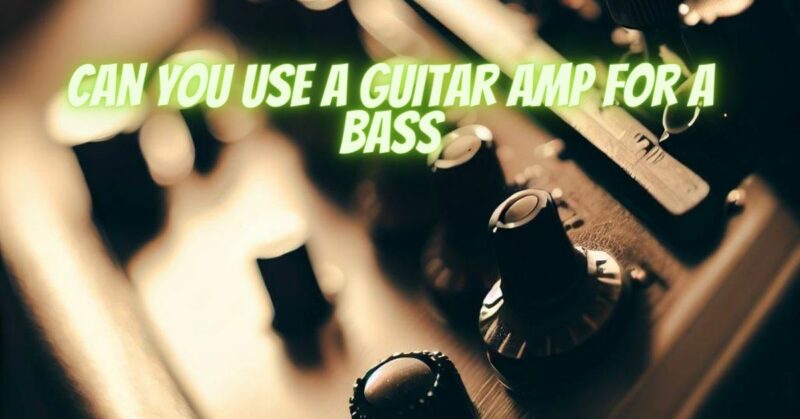When it comes to musical instruments, the interplay between different components can sometimes lead to intriguing experiments. One such question that often arises is whether it’s possible to use a guitar amplifier for bass guitar purposes. In this article, we’ll explore the feasibility of employing a guitar amplifier for bass guitar and delve into the potential outcomes and considerations.
Understanding the Differences:
Guitar and bass amplifiers are tailored to suit the unique characteristics of their respective instruments. While both amplifiers essentially perform the same task—amplifying an electric signal—there are distinct differences in the way they handle various frequencies, tones, and dynamics.
Bass frequencies are lower and have more energy compared to guitar frequencies. As a result, bass amplifiers are designed to handle these lower frequencies and produce a punchy, deep sound. Guitar amplifiers, on the other hand, are optimized to enhance the midrange and treble frequencies to achieve the characteristic guitar “bite” and sustain.
Using a Guitar Amplifier for Bass:
Using a guitar amplifier for a bass guitar is possible, but it comes with a few important considerations and limitations:
- Frequency Response: Guitar amplifiers might struggle to accurately reproduce the full spectrum of bass frequencies. This can result in a lack of depth and clarity in the bass sound. Additionally, pushing a guitar amplifier to produce deep bass frequencies can strain the amplifier’s speakers and potentially cause damage.
- Power Handling: Bass guitar signals require more power to drive the speakers effectively due to the lower frequencies. Guitar amplifiers might not have the necessary power handling capacity, which can lead to distorted and muddy bass tones.
- Tone Sculpting: Guitar amplifiers often have tone-shaping features that are optimized for guitar frequencies. Using these features with a bass guitar might not yield the desired results and could lead to tonal imbalance.
Mitigating the Limitations:
While using a guitar amplifier for bass purposes is not ideal, there are ways to mitigate the limitations and achieve reasonable results:
- Lower Volume: If you’re set on using a guitar amplifier, keep the volume levels at a reasonable level to avoid straining the speakers and causing damage.
- EQ Adjustments: Experiment with the amplifier’s EQ settings to find the best balance for your bass sound. Reducing the treble and boosting the bass can help compensate for the amplifier’s limitations.
- Pedals and Effects: Utilize bass-specific pedals and effects to shape your sound and add depth. This can help compensate for the amplifier’s inability to reproduce low frequencies accurately.
While it’s technically possible to use a guitar amplifier for a bass guitar, it’s not the optimal choice. Bass amplifiers are purpose-built to deliver the rich, deep tones that bass guitars produce. If you plan to play bass regularly, investing in a dedicated bass amplifier will ensure that you achieve the best possible sound quality and avoid potential damage to your equipment.
In the end, while experimentation is part of the creative process in music, it’s important to be aware of the limitations and potential drawbacks when using equipment in ways they weren’t originally intended.


